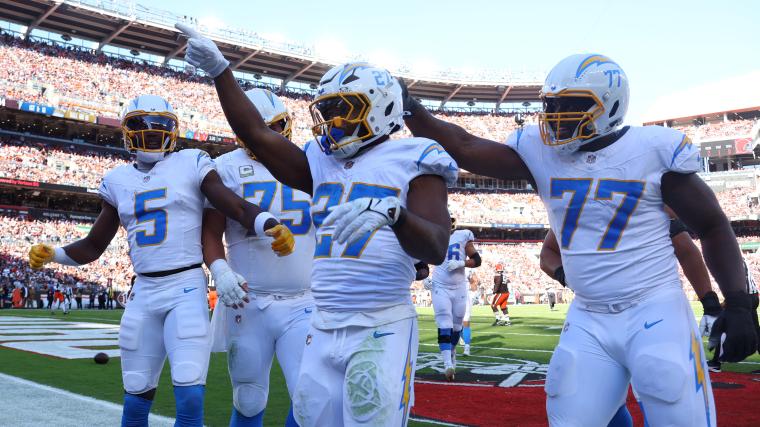
The Los Angeles Chargers found a sustainable offense that can take them far into the AFC postseason, something they did not show they had last week against the Cleveland Browns despite scoring just as many points.
Success Rate measures, simply how often an offense or defense is successful on each down. Generally, a play on offense is considered a success if it gains the following percentage of yards towards the next first down:
- First down: 50 percent
- Second down: 70 percent
- Third and fourth down: 100 percent
Some databases have a 40-60-100 breakdown. Regardless, it’s generally the same idea: Stay on or ahead of schedule and avoid negative plays.
The Chargers failed to do that most of the game against the Browns. They were 29th in offensive success rate, though they still put up 27 points (and could have had 31 if it were not for two missed kicks). It was an unsustainable offense that could win a road game in the postseason but not carry them through each of the Wild Card, Divisional Round, Championship Game, and Super Bowl. A success rate of 29.1 makes for an early postseason exit, which is why this writer pushed back against the heaps of praise for last week’s offensive explosion.
The Chargers struggled to sustain longer drives against the Browns:
- Drive 1: 4 plays, 18 yards, 1:15, Punt
- Drive 2: 6 plays, 30 yards, 3:44, Touchdown
- Drive 3: 3 plays, 8 yards, 2:05, Punt
- Drive 4: 3 plays, -16 yards, 1:56, Punt
- Drive 5: 3 plays, 70 yards, 1:29, Touchdown
- Drive 6: 5 plays, 60 yards, 2:47, Touchdown
- End of Half
- Drive 7: 3 plays, -1 yards, 0:52, Punt
- Drive 8: 3 plays, 6 yards 1:34, Punt
- Drive 9: 3 plays, 4 yards, 1:05, Punt
- Drive 10: 5 plays, 24 yards, 2:39, Missed FG
- Drive 11: 4 plays, -1 yard, 1:30, Punt
- Drive 12: 4 plays, 46 yards, 2:14, TD
Two of their three touchdown drives started in Cleveland territory. The Browns harassed the Chargers and forced 18 plays of two or fewer yards, including sacking Justin Herbert six times. Herbert had 282 yards and two touchdowns while running back JK Dobbins had 6.1 yards per rushing attempt and two touchdowns, but fans watching the game in its entirety and not just glancing at the box score could tell something was off.
Against the Tennessee Titans, the Chargers’ offense posted an offensive success rate of 50.0, good for fifth-best in the NFL this weekend ahead of Monday Night Football. Their first drive lasted nearly seven minutes; last week, they held the ball for nine minutes in the entire second half. They only punted on three of nine possible drives, with one of them on a drive that started with 0:36 left in the first half and the second a meaningless kill-the-clock drive to help wrap up the game.
Two key contributions to the success rate improvement: Gus Edwards’ return to form and Herbert not being sacked once (though Titans fans may disagree there). Edwards, who opened the season averaging under four yards per carry, returned from injury and looked like the running back fans were hoping to get. His 5.5 yards per attempt on on 10 carries kept the Chargers on a positive script.
Shocker, but Herbert not getting harassed and hit all game led to a better overall offense. According to Pro Football Focus, Herbert was sacked seven times and hit an additional three times last week. The blocking unit gave up 18 pressures and kept the offense off balance all game. Against a very stout Titans front that boasts Jeffery Simmons, the Chargers only allowed seven pressures, three hits, and zero sacks. Their second-half adjustments, in particular, flipped the game and squashed the Titans’ hopes of keeping it close.
The Chargers are still only 29th in offensive success rate on the entire season, a mark that has them below the Chicago Bears, Las Vegas Raiders, Carolina Panthers, and New England Patriots. But, if they can continue the positive momentum from Sunday, they could push their offense into a higher tier just in time for the postseason. They may have to figure it out quickly, as the teams that are first, second, fourth, fifth, and 11th in success rate are the Chargers’ next five opponents.








